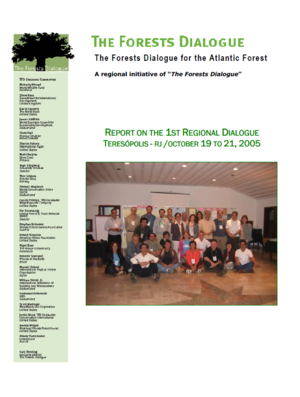Final Report : First Regional Dialogue on Forests and Biodiversity Conservation
During the period October 19 to 21, 2005, representatives of thirteen environmental organizations and five companies from the pulp & paper sector got together in Teresópolis, situated in the mountains behind Rio de Janeiro, to participate in the 1st Forest Dialogue for the Atlantic Forest.
During the three days of the event, these representatives of forestry companies and environmental organizations sat down together at the same table to discuss issues that are important to both groups, thereby getting under way a process of joint discussion of problems, expectations and possibilities for common action.
This first gathering of the Forest Dialogue for the Atlantic Forest may be considered a landmark event, as it symbolizes a new phase in relations between these two groups, getting together to deal with matters of common interest in a pro-active manner, instead of trying to overcome stalemates or discuss specific problems dividing the two. As a result, we were able to conduct a brief analysis of this relationship and define priority topics to be addressed, at least during this initial phase, as well as the way in which they will be addressed.
On the first day, representatives of both groups gave presentations on matters of interest to the gathering, including the companies’ experience in protecting forest remnants and restoring degraded areas, projects developed by the environmentalists, and the potential for cooperation between both groups for the conservation and restoration of the Atlantic Forest.The full presentations are available for accessing and downloading, at the following address: http://research.yale.edu/gisf/tfd/regionalfandb.html
On the second and third days of the event, the participants were encouraged to identify the main impediments and obstacles (restraining factors) and the main opportunities and benefits (driving forces) affecting the development of a common line of thinking and the establishment of partnerships and cooperation between the pulp & paper companies and the environmental organizations working in the Atlantic Forest. To this end, each participant listed what they considered to be the most important factors, and then defined the questions that should be given priority for action by The Forests Dialogue for the Atlantic Forest.

